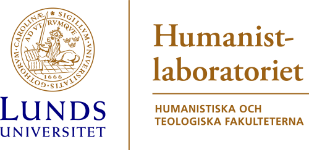News and events 2021 #3
Welcome to Lund University Humanities Lab!
Content of the newsletter
- Continued restrictions on how to conduct experiments in the lab during the pandemic
- Information about summer opening hours
- New publications
- The Annual Report 2020
- New youtube film
Covid-19 regulations until September 15th in the Lab
The Humanities Lab welcomes the gradual and orderly return to a post-pandemic situation for the University’s activities, as was announced by the Vice Chancellor on June 17th.
Given the prevailing recommendations to keep distance and adapt all activities to ensure a safe environment, and to help to reduce the spread of infection throughout society, the Lab will keep its current regulations until September 15th. This means that - as before - some of the Lab facilities are open for low scale experimental use, and that the established security protocols continue to be in force, allowing only a restricted number of individuals (read more on the lab homepage). We aim to update this information at the beginning of September, when we hope to have new guidelines for the safe and gradual return to normal research activities. For now, all users of continuing or new studies, must discuss with management what is possible (email user_agreements@humlab.lu.se from August. 16th).
Courses and training activities, autumn 2021
The courses and training activities offered by the Lab during the first half of fall 2021 is scheduled to be online, and more information on current pedagogical activities are found on the education pages.
New publications!
Swedish predicative oblique case: default or not?
The article reports on a study of the alternating use of Swedish nominative pronouns (e.g., jag, han, hon “I", “he", “she") and accusative pronouns (e.g., mig, honom, henne, “me’, “him”, “her"). Over time, there have been tendencies that either the accusative has been replaced by the nominative and vice versa. There is also interesting cross-linguistic variation in the use of these pronouns within the Germany languages. A survey of the acceptability of the two forms in various syntactic contexts was distributed to native speakers in Sweden and in the Swedish-speaking parts of Finland. The respondents rated the use of the two forms as “unacceptable”, “a bit strange, but not unacceptable” or “acceptable”. The results of the survey revealed that there are ongoing changes in the use of the two forms in the Swedish language, and therefore has interesting implications for sociolinguistic, grammatical and historical theories of language.
Halldor Armann Sigurdsson & Joost van de Weijer, 2021, (Accepted/In press) In: Acta Linguistica Hafniensia.
Challenges of releasing audio material for spoken data: The case of the London–Lund Corpus 2.
This article reports about the compilation of the new London–Lund Corpus 2 of spoken English and describes a method for anonymizing names and other features in spoken data. This allows researchers to share audio files together with transcriptions, which is a very useful resource for linguists working with corpus data.
Põldvere, N., Frid, J., Johansson, V., & Paradis, C. (2021). Challenges of releasing audio material for spoken data: The case of the London–Lund Corpus 2. Research in Corpus Linguistics, 9(1), 35–62
First article by the LANG-TRACK-APP team!
This article introduces the Experience Sampling Method (ESM), an approach stemming from medical and psychological research. In ESM studies, researchers use smartphone applications to prompt their participants to complete surveys at frequent, sometimes randomized times throughout the day. We discuss the potential that these methods hold for the field of second language acquisition, where they could be applied to study everyday language exposure and use.
Read the whole article here.
![[Translate to Svenska:] front page of annual report with bottles of desinfectant, face masks and gloves](/fileadmin/user_upload/humlab/typo3/News/Annual_report_2020.jpg)
The Annual Report 2020
The Lab year 2020 was dominated by the Covid-19 pandemic and its effects on education and research. Importantly, however, despite the semi-lockdown of the Lab in March 2020, Lab activities continued during the year, as this Annual Report will highlight.
Find and read the full report on the annual reports page.
Now on Youtube: How can we explore language in the rainforests? Project LANG-KEY
The LANG-KEY project opens up new horizons in the human sciences by providing scientific access to human diversity. It does so by situating field linguists at the center of an interdisciplinary research framework in which language expertise provides the crucial point of connection between researchers and lesser-known speech communities and knowledge systems.
See the film on the lab's Youtube channel
![[Translate to Svenska:] Back of a person in a jungle and text over image with title of film](/fileadmin/_processed_/6/3/csm_LANG_KEY_youtube_33fde00305.png)
Have a lovely summer!
![[Translate to Svenska:] small town houses with flowers in front](/fileadmin/_processed_/8/c/csm_DSC0318_91f13fed94.jpg)
Summer opening hours
The buildings SOL and LUX are closed to the public until further notice. LU-employees and LU -students can enter with LU-card + pin.
For users of the lab @SOL, please use the side entrance (link, scroll down to the bottom of page for directions to side entrance) when the SOL library is closed. This is especially important on August 2-3 when the stairs down to the lab will be cleaned and the library is closed both days.
As usual, all the doors to the lab are locked 24 hours, but users have access with card and pin code.
Contact
For equipment-related questions, use the function address indicated on the facilities page.
For administrative questions, contact our administrative staff.
Do you want to unsubscribe from these newsletters? Contact Maja Petersson.
![[Translate to Svenska:] humlab logo](/fileadmin/_processed_/1/e/csm_Humanistlaboratoriet-RGB-ENG_0f3328e5ea.png)

![[Translate to Svenska:] girl smiling at her smartphone](/fileadmin/_processed_/0/6/csm_image001_630547f857.jpg)